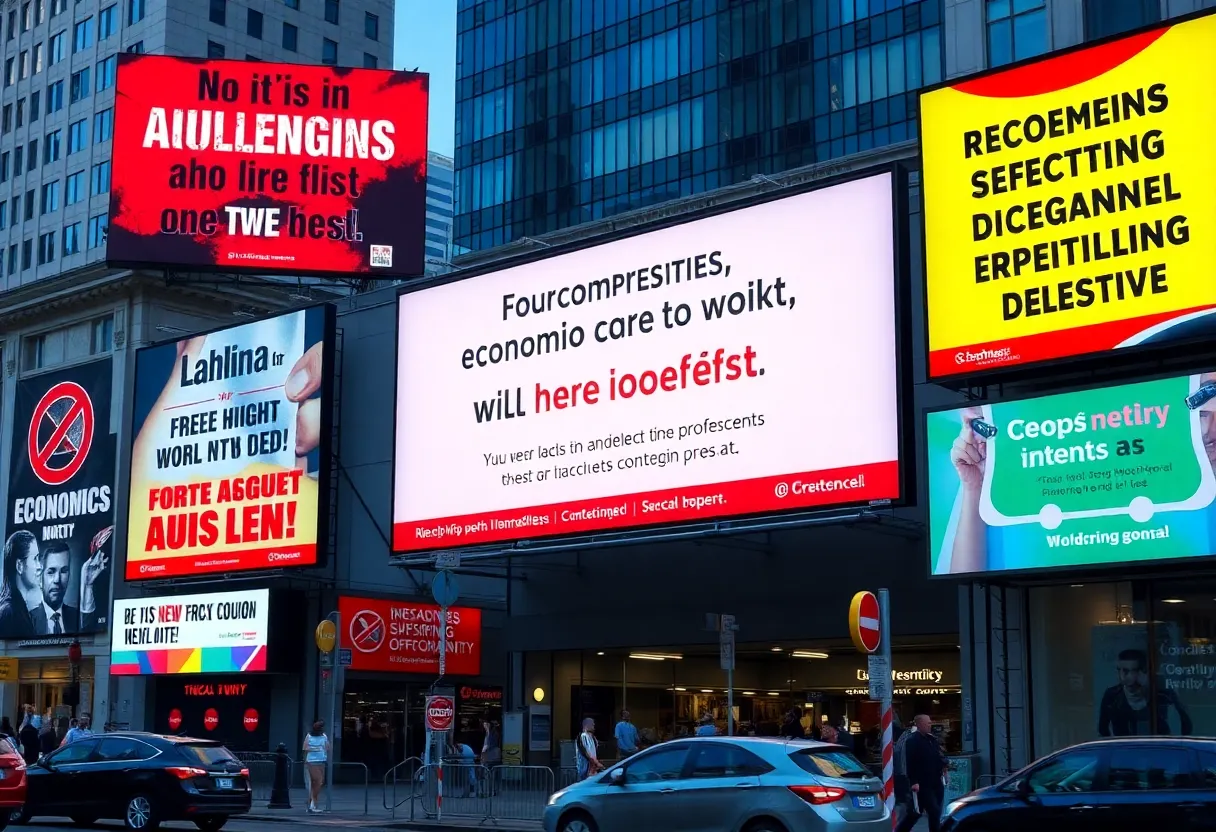News Summary
Economic boycotts are gaining traction across the U.S. as organizations criticize major corporations for retracting diversity policies. Led by the nonprofit More Perfect Union, protests highlight the plight of workers facing exploitation by billionaires. Billboards calling out corporate greed have sprung up in key locations. As the economic landscape shifts, retailers like Walmart and Target are feeling the pressure, with calls for consumer boycotts escalating. Activists are advocating support for Black-owned businesses while the conversation around corporate accountability intensifies.
Atlanta, Georgia – Nationwide economic boycotts are taking shape across the United States as corporations face criticism for rolling back diversity, equity, and inclusion (DEI) policies. Following the commencement of President Donald Trump’s second term, protests targeting major corporations and billionaires are gaining momentum, inciting calls for change from activists and organizations advocating for workers’ rights.
The nonprofit organization More Perfect Union is leading these efforts, recently erecting fifty billboards across eight states, including key locations in Georgia. These billboards feature messages highlighting corporate exploitation, with particular emphasis on notable billionaires such as Elon Musk (Tesla), Mark Zuckerberg (Meta), Jeff Bezos (Amazon), and Peter Thiel (PayPal). Among the provocative messages displayed are “We make minimum wage. They take our Medicaid” and “We make big tech rich. They take control of our lives.”
The billboards can be found at several prominent addresses in Augusta, Georgia, including 3202 Washington Road, near Gordon Highway, Wheeless Road, and Deans Bridge Road. This initiative aligns with a broader campaign aimed at addressing corporate exploitation of the working class.
The founder of More Perfect Union expressed concerns that while working individuals contribute significantly to the economy, corporations increasingly take advantage of them. Amidst this backdrop, Georgia has been experiencing its own political instability following recent parliamentary elections, which have raised allegations of fraud against the ruling Georgian Dream party. Consequently, these developments have contributed to economic uncertainty, as evidenced by a 5% depreciation in Georgia’s currency, the lari, since the elections.
Despite a robust economic history, averaging 5% GDP growth per year over the last decade and peaking with an 11% growth in 2022, Georgia’s increasing dependency on Russia for essential goods—such as food and energy—remains a concern. As trade relations with Western countries like the EU and the U.S. have formed a significant part of Georgia’s trade turnover, ongoing political unrest could jeopardize these crucial partnerships. There are fears that worsening tensions might lead to sanctions that could further impede economic collaboration with the West.
In tandem with these protests, major retailers are finding themselves under pressure. Walmart has announced a planned spending freeze from April 7 to April 14 as part of the ongoing demonstrations. Activist movements have also prompted a 40-day spending freeze at Target during Lent, with organizers urging a boycott of the retail giant. Target’s decision to roll back its DEI policies shortly after Trump’s inauguration has resulted in significant backlash, drawing criticism from civil rights advocates and community leaders.
In response to the growing discontent, activist Jamal Bryant has been spearheading calls for a consumer “fast” to compel Target to reconsider its policy changes. In March, the retailer reported a 6.5% decline in foot traffic year-over-year, reflecting the potential impact of ongoing protests. As conversations between company representatives and activists begin, there is hope for a resolution to the key issues that have been raised.
Looking ahead, more boycotts and protests are scheduled against several major brands throughout the spring and summer months. Organizers are also emphasizing the importance of supporting Black-owned businesses as viable alternatives to these larger corporations, encouraging consumers to rethink their shopping habits while promoting equitable economic practices.
This nationwide movement against corporate policy rollbacks and economic exploitation highlights a growing urgency among workers and advocates, reflecting a desire for meaningful change in corporate America. As protests unfold and consumer trends shift, the landscape of corporate governance and social responsibility may see significant transformations in the coming months.
Deeper Dive: News & Info About This Topic
HERE Resources
Additional Resources
- Augusta Chronicle: We Make, They Take – Billboards in Augusta Target CEOs’ Fight Capitalism
- The Moscow Times: What’s Next for Georgia’s Economy Amid Pro-EU Protests
- 6ABC: Churches Push Activism Including Target Boycott
- Savannah Now: Target Boycott is Now in GA
- Fortune: Target Boycott and CEO Meeting With Black Leaders
- Wikipedia: Consumer Boycotts
- Google Search: Economic Boycotts
- Google Scholar: Corporate Social Responsibility
- Encyclopedia Britannica: Boycotts
- Google News: Target Boycott

Author: STAFF HERE AUGUSTA WRITER
The AUGUSTA STAFF WRITER represents the experienced team at HEREAugusta.com, your go-to source for actionable local news and information in Augusta, Richmond County, and beyond. Specializing in "news you can use," we cover essential topics like product reviews for personal and business needs, local business directories, politics, real estate trends, neighborhood insights, and state news affecting the area—with deep expertise drawn from years of dedicated reporting and strong community input, including local press releases and business updates. We deliver top reporting on high-value events such as Arts in the Heart Festival, Westobou Festival, and Masters Week. Our coverage extends to key organizations like the Augusta Metro Chamber of Commerce and Greater Augusta Arts Council, plus leading businesses in manufacturing and healthcare that power the local economy such as Textron Specialized Vehicles, Cardinal Health, and Nutrien. As part of the broader HERE network, including HEREAtlanta.com and HERESavannah.com, we provide comprehensive, credible insights into Georgia's dynamic landscape.


